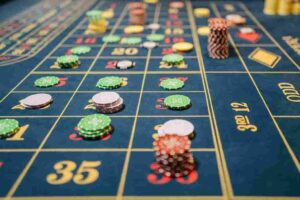Poker training programs are invaluable resources for players looking to improve their skills and strategy in the game. This article explores various types of poker training programs, their benefits, and how players can choose the right one to enhance their gameplay.
Understanding the Importance of Poker Training
Why Invest in Poker Training Programs?
Poker is a game of skill that requires strategic thinking, mathematical proficiency, and psychological insight. Training programs offer structured learning environments to help players develop these essential skills and improve their overall performance at the tables.
Types of Poker Training Programs
Online Poker Courses
Online platforms offer courses tailored to different skill levels, from beginner to advanced. These programs cover fundamental concepts, advanced strategies, hand analysis, and specific game variations like Texas Hold’em and Omaha.
Poker Coaching Services
Personalized coaching sessions provide one-on-one guidance from experienced poker professionals. Coaches analyze gameplay, identify strengths and weaknesses, and offer tailored strategies to help players refine their skills and adapt to evolving game dynamics.
Training Videos and Webinars
Video-based training modules and webinars allow players to learn at their own pace. They feature live gameplay analysis, strategy discussions, and Q&A sessions with expert players, providing insights into real-time decision-making and tactical approaches.
Interactive Training Apps
Mobile applications gamify the learning process with quizzes, challenges, and simulated gameplay scenarios. These apps enhance engagement and offer immediate feedback on strategy execution, making learning poker more accessible and interactive.
Live Workshops and Seminars
In-person workshops and seminars provide immersive learning experiences, allowing participants to interact with instructors and peers. These events often include live demonstrations, group exercises, and networking opportunities within the poker community.
Benefits of Poker Training Programs
Skill Development and Strategy Enhancement
Training programs systematically improve players’ understanding of poker fundamentals, refine their decision-making abilities, and equip them with advanced strategies to navigate diverse game situations effectively.
Confidence Building and Mental Toughness
Regular practice and feedback from training programs bolster players’ confidence in their abilities and resilience in handling variance and pressure at the tables. Mental toughness training prepares players for the psychological challenges of competitive poker.
Access to Expertise and Community Support
Engaging with poker coaches and fellow learners fosters a supportive learning environment. Expert advice and peer collaboration provide valuable perspectives, strategies, and encouragement to continually progress in poker proficiency.
How to Choose the Right Poker Training Program
Assessing Learning Objectives and Curriculum
Evaluate programs based on their alignment with your learning goals, whether it’s mastering specific game formats, improving tournament strategies, or enhancing overall poker skills.
Instructor Credentials and Reputation
Research instructors’ backgrounds, achievements, and reviews from past students to gauge their credibility and teaching effectiveness in delivering actionable insights and strategies.
Interactive Features and Learning Formats
Choose programs that offer diverse learning formats, such as interactive exercises, live sessions, and comprehensive resources, to cater to different learning preferences and maximize engagement.
FAQs about Poker Training Programs
What is the recommended starting point for beginners in poker training?
Beginners should start with foundational courses covering basic rules, hand rankings, and fundamental strategies. Building a solid understanding of poker fundamentals lays a strong groundwork for advanced learning.
How can poker training programs help intermediate players advance their skills?
Intermediate players benefit from advanced strategy courses, focused hand analysis sessions, and live gameplay reviews. These programs refine decision-making abilities and deepen understanding of game dynamics.
Are poker training programs worth the investment for recreational players?
Yes, recreational players can benefit from training programs tailored to their skill levels and learning pace. These programs enhance enjoyment of the game by improving proficiency and confidence in competitive play.
Can poker training programs help players transition to professional poker careers?
Yes, comprehensive training programs offer pathways for aspiring professionals by providing advanced strategies, mental game coaching, and networking opportunities essential for competitive success.








